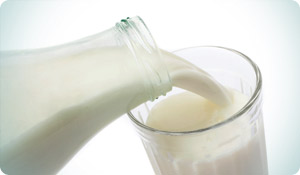
If you or your child has a milk allergy, you probably go to great lengths to steer clear of all dairy products that can trigger a reaction. Therefore, the findings of a new study may go against your instincts. Researchers representing John Hopkins Children's Center and Duke University recently discovered that drinking milk can actually be helpful in overcoming a milk allergy. However, this information comes with an important warning: this must be done only under close medical supervision and is not something you should try at home.
The Rundown on Milk Allergy
Today, as many as three million children suffer from food allergies, with milk being the most common offender. Yet milk also offers many health benefits for kids and is also used to prepare many foods, putting children with a milk allergy at risk for serious consequences if they inadvertently eat or drink something with milk as an ingredient.
The Benefits of Immunotherapy
If you've ever had allergy shots or immunotherapy, you know that they work by exposing you to small doses of the very things that trigger your allergies. As your body gets used to the substance, the amount is very gradually increased, helping to build up a tolerance.
This is the same principle that researchers explored with a milk allergy. The researchers tried giving children will milk allergies small amounts of milk powder and slowly increased the amount. Surprisingly enough, over time this was able to help children lessen, or even overcome, their milk allergy.
Ground-Breaking Milk Allergy Research
This study was the first of its type to look at milk immunotherapy. And while researchers only looked at a small number of children (under 20) who were between the ages of 6 and 16, the results of their experiences was encouraging and offers hope for future treatment of food allergies. In addition to being better able to tolerate milk after being exposed to it consistently, the benefits of the milk powder continued to build as children took it for longer periods. To maintain the effectiveness, a daily dose of milk should be continued, at least for now, since researchers are unsure if the effects will last if the milk allergy would come back if regular exposure to it is lessened.
How it Works
What researchers believe is that over time, this exposure to milk retrains the body's immune system to remove the sensitivity and enable it to tolerate the allergen without ill effects. While historically there has been no "cure" for food allergies that exists, this is the closest thing to finding an effective treatment approach to avoid the negative reactions a milk allergy, and other food allergies, can cause.
This is a very significant finding, since people with food allergies can be at risk to having a life-threatening reaction. Therefore, reducing or eliminating this risk can have obvious benefits.
Scientists will be conducting further studies to better understand the effects. In the meantime, you may want to talk to your physician or pediatrician to see if this approach may be helpful in your situation.
Sources:
American Academy of Allergy, Asthma and Immunology
http://www.aaaai.org/patients/resources/easy_reader/food.pdf
Johns Hopkins Children's Center
http://www.hopkinschildrens.org/drinking-milk-to-ease-milk-allergy.aspx
The Journal of Allergy and Clinical Immunology
http://www.jacionline.org/article/S0091-6749%2808%2901725-9/abstract





